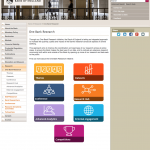The ‘Northern Powerhouse’ is one of the prominent (albeit perceived to be failing) public policy strategies that have not been discontinued by Theresa May’s government after the Brexit referendum. Indeed, it has good intentions but it has still not done enough to address the problematic North-South divide. Enabling a genuine choice of monies amongst agents (including individuals, businesses, financial institutions, etc. in terms of allowing entities to pay taxes in, be paid in and to trade in multiple monies) would actually complement and help fulfill this important, well-intentioned objective.
By re-legislating and working to improve rules and regulations in order to allow the wholly public money, the British pound, to compete with private monies as well as potentially introducing public-private partnership monies, peoples in various regions (whether that be Yorkshire, Merseyside, Manchester, Newcastle or elsewhere, for example) would be able to not only choose GBP but also alternative monies to trade, pay taxes in and so on.
If various agents (such as individuals and businesses) chose to use a money with a relatively weaker exchange rate when exporting services and/or goods abroad, it would ensure competitiveness whilst they also used relatively stronger monies when importing so that they do not simultaneously suffer from inflation. The improvement in trade, amelioration of unemployment and corresponding increase in output would incentivise further investment in these regions.
However, wholly private monies may not be trusted as a means of exchange in the short-term and, therefore, the benefits entailed by a choice of monies may not be realised as quickly as we would like. As such, introducing public-private partnership monies could be a pragmatic, liberalising and politically feasible means through which to ease agents into using multiple monies (and thereby open up peoples’ interest in using wholly private monies as well).
Furthermore, these public-private partnership monies allow for the possibility of auctions that could raise billions in private investment and it need not be the case that the central government based in Westminster need be a primary partner. Councils could also be public partners and coinciding with more mayors being elected across the North, cities could be involved too. So, it’s not just Westminster that could be involved with public-private partnership monies but also County Councils and City Councils (for example) or even the Welsh parliament and Scottish parliament. Indeed, this would be a natural complement to the already highly prevalent systems of New Public Management. As such, the money raised from auctions from these public-private partnerships could be earmarked not only to fund cuts in national income taxes and/or corporation taxes but also council tax, for example.
Of course, one may argue that multiple monies may only serve to heighten inequality but this ignores the possibility that they may actually make it more feasible to tackle inequality. One might also argue that this would divide the country further and actually run counter to the objectives of the Northern Powerhouse through monetary segregation (for example) but this is a false contention since people would not be restricted to a Yorkshire Pound, a Liverpool Pound, a Cornish Pound, an Edinburgh Pound, a Cardiff Pound, a Manchester Pound or a Sheffield Pound, for example, but would be able to use a mixture of them (according to their varying expectations-management preferences) alongside the pre-existing Great British Pound Sterling.
Additionally, this would also help mitigate the fallout from a potentially catastrophic financial crisis (that would, inevitably, afflict the North far more adversely than the South, though the South would also be hard hit) which has been primed further through increased Quantitative Easing and prolonged, excessively low interest rates alongside other geopolitical risks (associated with the breakup of the European Union looking increasingly more likely, for example). It would also help address the gendered impact of central banking through enabling Free(r) Banking systems.
Ultimately, a wide variety of stakeholders would largely benefit from such an arrangement and the world would be able to derive valuable lessons as Britain takes the lead in significant, meaningful, beneficial and much-needed monetary policy reform. Indeed, this would also require cooperation from the Bank of England when introducing public-private partnership monies since they have long-standing, cemented expertise in handling money supply; indeed, they may have extra benefit to do so seeing as the Monetary Policy Trilemma could potentially be solved and/or become irrelevant in light of a Choice of Monies.



